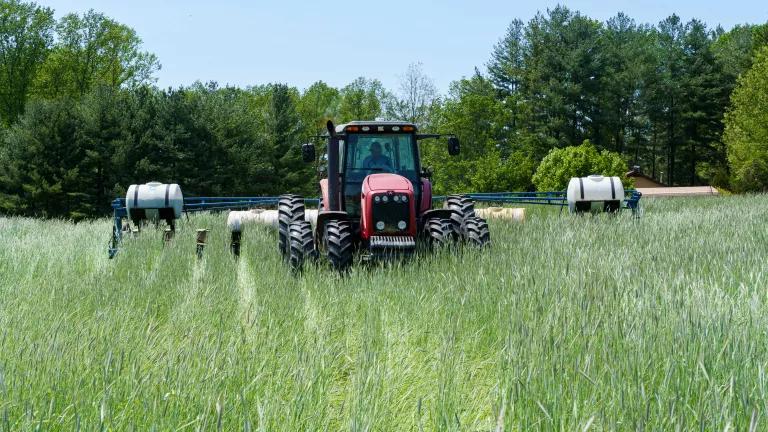Good Soil Policy in Senate Farm Bill
The Senate Agriculture Committee just marked up a Farm Bill today that includes some innovative new provisions to improves soil health on farms. While the overall bill has some problems and there is room for improvement, this bill does some good work on soil policy.

The Senate Agriculture Committee passed their version of a 2018 Farm Bill through the committee today, and we were pleased to see a number of the soil policy changes that we support included in the bill.
The Farm Bill is over one thousand pages long, and covers policies from agricultural trade to nutrition to conservation, and it is always a mixed bag for the environment and human health. The 2018 Farm Bill has been no exception. The Senate Farm Bill has some problems (it contains at least one bad exemption to the National Environmental Policy Act), but other elements represent a bipartisan effort at statesmanship that was sorely lacking in the House Farm Bill, which failed to pass on the House floor last month. NRDC vehemently opposed the House bill, which was chock full of attacks on bedrock environmental law—not to mention the detrimental changes to the food stamp program that caused bipartisan Committee negotiation to fall apart in the first place. Whether or not NRDC is able to support a final Farm Bill in 2018, this first draft from the Senate Agriculture Committee contains some soil health provisions that are very forward-thinking and deserve praise.
A Pilot Program for Soil Carbon Performance
The Senate Farm Bill includes a new pilot program within the existing Environmental Quality Incentives Program that will pay farmers for building soil health and measure the gains in soil carbon. By building soil carbon, farmers can help fight climate change, and also build the organic matter that will make their farms more resilient to extreme weather resulting from climate change. NRDC’s partners at Environmental Entrepreneurs advocated for this program on behalf of a coalition that included NRDC, American Coalition for Ethanol, and the National Corn Growers Association. Senator Wyden (D-OR) supported the coalition’s goals of creating incentives for soil carbon, and shepherded this project from concept to reality; we were delighted to see that Senators Roberts and Stabenow included it in the draft bill.
Knocking Down Barriers to Cover Cropping
We’ve written extensively about how the crop insurance program has inadvertently prevented some farmers from choosing to plant cover crops. (See my blog here, and our Covering Crops report.) This is very unfortunate, because cover crops are an important tool for building healthy soil that reduces risk and keep farms in business. The Senate Farm Bill just made an important step in getting rid of this barrier by classifying conservation practices as good farming practice, which would help protect farmers from being penalized.
We hope this will finally resolve this problem, but time will tell. The Senate bill states quite clearly that “cover crop termination shall not affect the insurability of subsequently planted insurable crop.” But then it also says that the cover crop termination must be carried out according to guidelines determined by USDA’s Natural Resource Conservation Service or an agricultural expert. We hope that this will allow more flexibility to cover crop farmers in the future. We have also seen a positive change by several crop insurance companies, who have been supportive of Iowa’s crop insurance discount for cover crops. Fingers crossed that the combination of increasing awareness among crop insurance agents about the benefits of cover crops combined with this Congressional mandate will put an end to this problem.
Performance-Based Discounts for Good Stewardship
Wowie, we were blown away by this provision in the bill. For a long time, we have been trying to find ways to get cover crop farmers a discount on their crop insurance. At NRDC, we see good stewardship discounts as a promising way to leverage federal spending and provide more incentives for soil health to improve water quality and fight climate change. But we also think this will help ensure that taxpayer dollars are used effectively, and that the crop insurance program is actually mitigating farm risk, instead of encouraging more risk with increased intensive monoculture cropping. The Senate Farm Bill gives USDA more flexible authority to offer discounts to farmers who use techniques that reduce risk relative to other practices, like crop rotations and cover crops. The Senate Agriculture Committee deserves commendation for this innovative step.
Coordinates USDA Data on Conservation and Risk Management
On a related issue, the Senate bill also includes instructions to USDA to collect data on conservation practices (like cover crops) to determine how these practices improve crop yield. This is critical for setting up performance-based discounts; USDA needs that data to determine whether conservation practices reduce risk, and by how much. The House bill also included a provision on data collection, but it was not very specific. In contrast, the Senate bill spells out the purpose of the data collection effort, names the USDA agencies who may provide data, gives instructions to USDA to report the results of their findings, and then goes a step further, asking USDA to develop tools for farmers that will help them put these risk-reducing practices to use on their farms.
In addition to those major improvements, we saw quite a few other provisions in the bill to improve soil health and prioritize water quality and efficiency. We particularly liked the improvements to the Whole Farm Revenue Protection Program, which is designed to offer support for more diversified farming operations that are better for soil, water, and ecosystem health in general. The bill also offers support for soil testing for toxic substances, like heavy metals, which we don’t want in the soil where we grow our food.
There is room for improvement, too—for example, the Committee bill missed an opportunity for expansion of the Sodsaver provision that protects carbon rich native soils from being plowed. The exemption to the National Environmental Policy Act for sage grouse habitat remains a serious problem. There were several troubling amendments offered and withdrawn in today's markup that we don't want to see in a final bill.
But the conservation features of the Senate Farm Bill passed through today's markup are much better than the House’s. We will keep an eye on its progress and hope the above provisions remain intact throughout the months of negotiations ahead.




